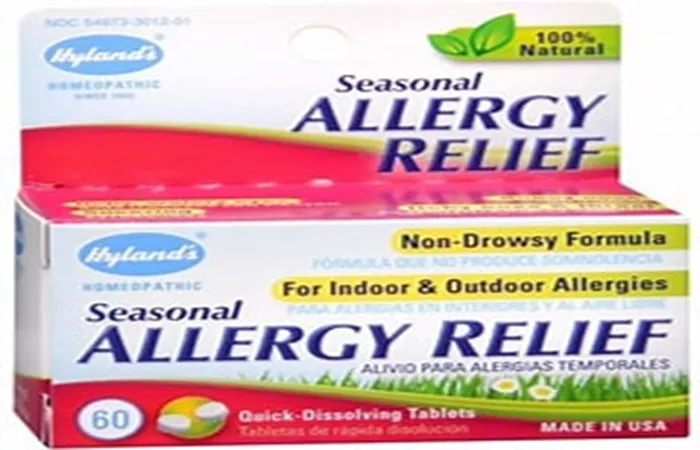Seasonal allergies, also known as allergic rhinitis or hay fever, can significantly impact daily life, causing symptoms like sneezing, nasal congestion, itchy eyes, and throat irritation. Fortunately, there are several effective options available for managing these symptoms. This article will provide a detailed overview of the best seasonal allergy relief options, including over-the-counter (OTC) medications, natural remedies, and lifestyle changes.
Understanding Seasonal Allergies
Seasonal allergies occur when the immune system overreacts to airborne allergens such as pollen, mold spores, and dust mites. Common triggers include tree, grass, and weed pollen, which vary by season and geographical location. Symptoms often include sneezing, nasal congestion, itchy eyes, and throat irritation, significantly impacting daily activities and sleep quality.
OTC Medications for Seasonal Allergy Relief
Antihistamines
Antihistamines work by blocking the effects of histamine, a chemical released by the immune system during an allergic reaction. They are available in both first-generation and second-generation forms. Second-generation antihistamines are generally preferred due to their lower likelihood of causing drowsiness.
Cetirizine (Zyrtec Allergy)
- Form: Tablet, liquid
- Symptoms Treated: Sneezing, runny nose, itchy/watery eyes, itchy nose or throat
- Frequency: Once daily
- Strengths: Effective for moderate to severe symptoms, provides long-lasting relief.
- Side Effects: May cause mild drowsiness in some users.
Fexofenadine (Allegra Allergy)
- Form: Tablet, liquid
- Symptoms Treated: Sneezing, runny nose, itchy/watery eyes, itchy nose or throat
Frequency: Once daily - Strengths: Least likely to cause drowsiness, fast-acting relief.
- Side Effects: Generally non-drowsy.
Loratadine (Claritin)
- Form: Tablet, chewable tablet
- Symptoms Treated: Sneezing, runny nose, itchy/watery eyes, itchy nose or throat
- Frequency: Once daily
- Strengths: Most consistently non-drowsy, gentle on sensitive users.
- Side Effects: Generally non-drowsy.
Nasal Corticosteroids
Nasal corticosteroids are highly effective for relieving nasal symptoms. They work by reducing inflammation in the nasal passages.
Fluticasone Propionate (Flonase Allergy Relief)
- Form: Nasal spray
- Symptoms Treated: Nasal congestion, runny nose, sneezing, itchy nose
Frequency: Once daily - Strengths: Highly effective in reducing inflammation and congestion.
- Side Effects: Potential for nasal irritation, nosebleeds.
Budesonide (Rhinocort Allergy)
- Form: Nasal spray
- Symptoms Treated: Nasal congestion, runny nose, sneezing, itchy nose
- Frequency: Once daily
- Strengths: Effective in managing symptoms.
- Side Effects: Generally well-tolerated.
Triamcinolone (Nasacort Allergy 24 Hour)
- Form: Nasal spray
- Symptoms Treated: Nasal congestion, runny nose, sneezing, itchy nose
- Frequency: Once daily
- Strengths: Effective in managing symptoms.
- Side Effects: Generally well-tolerated.
Cromolyn Sodium Nasal Spray
Cromolyn sodium works by preventing the release of substances that cause inflammation in the nasal passages.
Cromolyn Sodium (Nasalcrom)
- Form: Nasal spray
- Symptoms Treated: Nasal congestion, runny nose, sneezing, itchy nose
- Frequency: Three to six times daily
- Strengths: Considered very safe, effective if started before allergy season.
- Side Effects: Generally well-tolerated.
Decongestants
Decongestants provide rapid, short-term relief from nasal and sinus congestion. However, they are not recommended for long-term use due to potential side effects.
Pseudoephedrine (Sudafed)
- Form: Tablet, liquid gel capsules
- Symptoms Treated: Nasal and sinus congestion
- Frequency: Every 4 to 6 hours
- Strengths: Provides rapid relief from congestion.
- Side Effects: May cause insomnia, headaches, increased blood pressure.
Combination Medications
Combination medications combine the effects of antihistamines and decongestants to provide comprehensive relief.
Loratadine and Pseudoephedrine (Claritin-D)
- Form: Tablet
- Symptoms Treated: Nasal congestion, sinus pressure, sneezing, runny nose, itchy/watery eyes, scratchy throat or nose
- Frequency: Twice daily
- Strengths: Provides relief from both nasal and non-nasal symptoms.
- Side Effects: May cause drowsiness and other side effects associated with decongestants.
Natural Remedies for Seasonal Allergy Relief
Several natural remedies have been studied for their potential benefits in alleviating seasonal allergy symptoms.
- Honey: Local honey may help desensitize the immune system to pollen allergens, reducing symptoms of allergic rhinitis.
- Nasal Irrigation: Using a Neti pot with saline solution can help flush out allergens and reduce nasal congestion.
- Quercetin: This plant flavonoid can stabilize mast cells and reduce histamine release, alleviating allergy symptoms.
- Butterbur: Extracts of this herb can inhibit leukotriene production, reducing inflammation and congestion.
- Probiotics: Certain strains of probiotics can help regulate gut microbiota, reducing allergic reactions.
- Eucalyptus Oil: This essential oil has anti-inflammatory and decongestant properties, helping to reduce nasal congestion.
- Stinging Nettle: This herb has natural antihistamine properties, reducing histamine levels and alleviating symptoms.
- Omega-3 Fatty Acids: These fatty acids have anti-inflammatory effects, helping to reduce seasonal allergy symptoms.
Conclusion
Seasonal allergies can be challenging, but there are several effective options available for managing symptoms. OTC medications like antihistamines, nasal corticosteroids, and decongestants provide relief for a range of symptoms. Natural remedies and lifestyle changes can also help reduce allergen exposure and improve overall comfort. Always consult with a healthcare provider to determine the best treatment plan for your specific needs. With the right approach, you can manage your seasonal allergies and improve your quality of life.
Relative topics:
Apple Cider Vinegar for Colds: Remedies, Benefits & Uses
Picking the Right Cold Medication by Your Symptoms
Cold Allergy: Symptoms, Treatment, Prevention Tips & More

